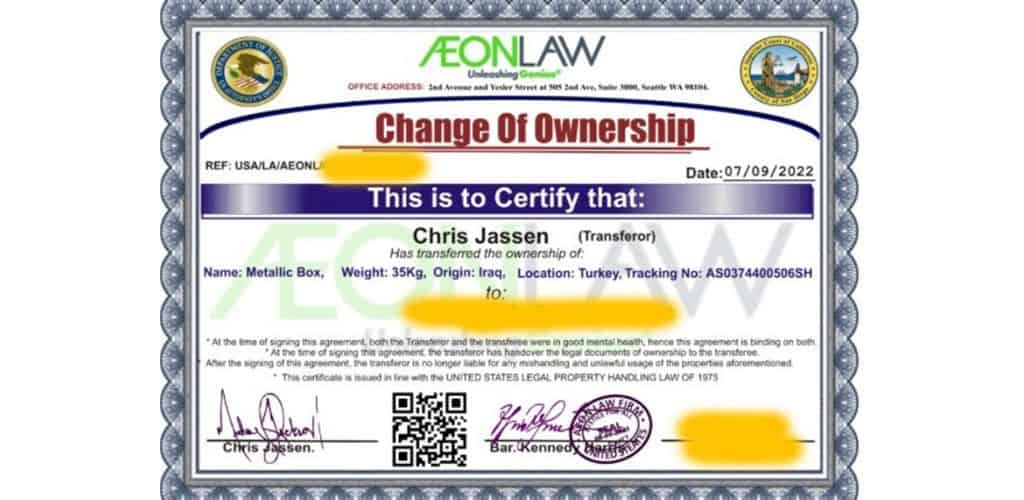The form at the top of this blog is a photoshopped patchwork of real and fake elements – including AEON Law’s name, logo, and address. Unfortunately, such scams are common, and too many people fall victim to them.
Here are some ways you can protect yourself.
Scam Calls
The US Patent and Trademark Office (USPTO) is warning people to beware of scam calls that purport to be from the USPTO.
As the alert notes,
Scammers have recently started calling trademark customers and falsely claiming to be an employee of the United States Patent and Trademark Office (USPTO). The scammers use a tactic called “spoofing,” where they will trick phone networks into displaying a name, number, and location different from their actual name, number, and location. They’re trying to trick you into believing you’re talking to the USPTO, so they can steal money or personal information from you.
The real USPTO will never ask for personal or payment information over the phone. If you’ve received such a call, you can:
- Contact the Trademark Assistance Center (TAC) to verify the call was from a USPTO employee and for assistance on what to do next.
- If you have the number that called you, give it to the TAC representative who answers your call.
- Check the Trademark Status and Document Retrieval (TSDR) system to see official communications sent about your trademark submission. (You can view the documents by entering your application or registration number in TSDR and selecting the “Documents” tab).
More info about what you can do if you’ve been scammed is here.
Fake Registration Services
Applicants for trademarks, patents, and copyrights, or people who post on IP-related forums, may receive official-looking messages inviting them to register their work.
Legitimate entities such as the USPTO never do this. You need to reach out to them to register.
Invention Promotion Scams
An invention promotion scam invites a patent holder or applicant to pay for “development” or “marketing” of their invention.
As the Federal Trade Commission (FTC) notes, “many invention promotion firms claim – falsely – that they can turn almost any idea into cash.”
The FTC suggests being on the lookout for language like this:
- “We think your idea has great market potential.”
- “Our company has licensed a lot of invention ideas successfully.”
- “You need to hurry and patent your idea before someone else does.”
- “Congratulations! We’ve done a patent search on your idea, and we have some great news. There’s nothing like it out there.”
- “Our research department, engineers, and patent attorneys have evaluated your idea. We definitely want to move forward.”
- “Our company has evaluated your idea, and now wants to prepare a more in-depth research report. It’ll be several hundred (or thousand) dollars.”
- “Our company makes most of its money from the royalties it gets from licensing its clients’ ideas. Of course, we need some money from you before we get started…”
A company that has licensed inventions successfully should be able to provide you with a list of those inventions. But also check to see whether all those patents were actually owned by the company trying to sell you services – rather than by their clients. Also, were those inventions licensed to well-known companies or to no-name companies that may not even exist, or may be in cahoots with the licensing company?
As the FTC notes,
Many invention promotion firms claim to perform patent searches on ideas. Patent searches by fraudulent invention promotion firms usually are incomplete, conducted in the wrong category, or unaccompanied by a legal opinion on the results of the search from a patent attorney. Because unscrupulous firms promote virtually any idea or invention without regard to its patentability, they may market an idea for which someone already has a valid, unexpired patent. In that case, you may be the subject of a patent infringement lawsuit – even if the promotional efforts on your invention are successful.
In general, if your idea/patent is so valuable, why isn’t the invention promotion firm willing to be paid out of a share of the profits that are sure to come?
In a legitimate IP licensing situation, the licensee pays the licensor (IP owner) – not the other way around.
Under The American Inventors Protection Act of 1999, before an invention promoter can enter into a contract with you, it must disclose the following information covering the past five years:
- how many inventions it has evaluated,
- how many of those inventions got positive or negative evaluations,
- its total number of customers,
- how many of those customers received a net profit from the promoter’s services, and
- how many of those customers have licensed their inventions due to the promoter’s services?
Customers injured by failure to disclose the required information or by any materially false or fraudulent representation by the promoter can sue to recover statutory damages up to $5,000 or actual damages. Damages of up to three times the amount awarded are available for intentional or willful violations of the Act.
If you’ve been offered such a questionable “opportunity,” it’s a good idea to have an IP lawyer review any agreement you’ve been sent before you sign or send money.
Just like the haiku above, we like to keep our posts short and sweet. Hopefully, you found this bite-sized information helpful. If you would like more information, please do not hesitate to contact us here.


